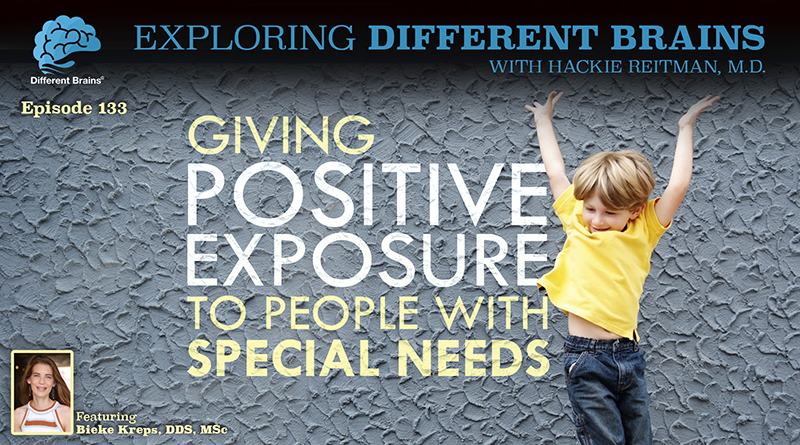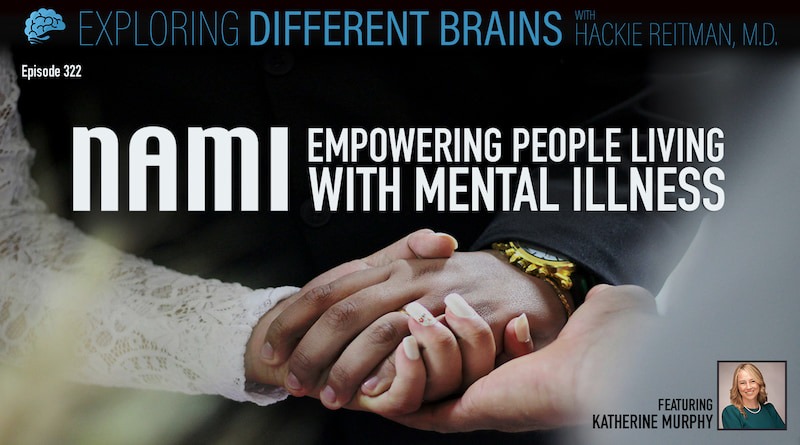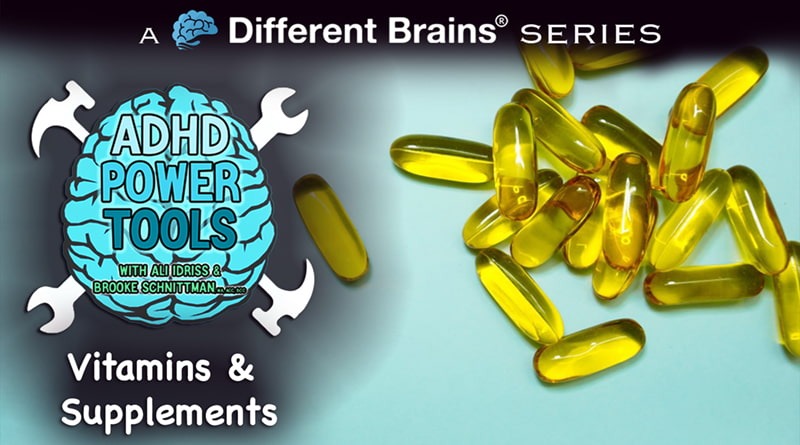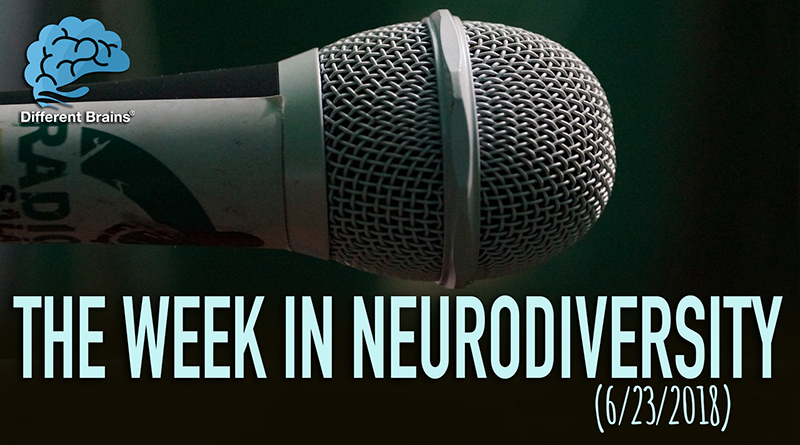
Giving Positive Exposure to People with Special Needs, with Bieke Kreps, DDS, MSc | EDB 133
(16 mins) In this episode, Dr. Hackie Reitman speaks with Bieke Kreps, DDS, MSc, director for Positive Exposure Europe/Belgium. Dr. Kreps is a pediatric dentist, a scientific researcher, a member of the AADMD (American Academy of Developmental Medicine and Dentistry)and a teacher and adjunct associate professor in the Department of Pediatric Dentistry at NYU College of Dentistry. The two discuss how Positive Exposure is trying touching the way the world thinks of people with special needs, and how dentists can better care for patients with intellectual and developmental differences.
For more about Positive Exposure, visit: https://positiveexposure.org/
.
40 Second Preview:
.
To listen or download the podcast version of this episode, see the embedded player below.
Or look for us on your favorite podcast provider:
iTunes | Stitcher | SoundCloud
[expand title=”View Full Transcript”]
What is “Positive Exposure”?
HACKIE REITMAN, M.D. (HR): Hi I’m Dr. Hackie Reitman, welcome to another episode of exploring different brains and today we are so lucky because we travel all across the ocean and we go all the way to Belgium where we find Dr. Bieke Kreps who I first met out at the American Academy of developmental doctors and dentists and Bieke does so much in so many different ways and is amongst all the other things she’s doing besides being a wonderful dentist and besides taking care of a lot of people with special needs she’s also the Belgian director of Positive Exposure Belgium and we’re going to learn a lot more about Dr. Bieke Kreps. Bieke welcome!
BIEKE KREPS, DDS, MSc (BK): Thank you, Hackie
HR: Thank you so much for being here. Why don’t you introduce yourself to our audience because I know how excited I was to learn all about what you’re doing and where you are and everything that’s going on.
BK: So I am Bieke Kreps. I am 32 years old and I am a pediatric dentist and I mainly specialize in treating children with special needs and medically compromised children. I have my own referral practice, which is hospital based in Belgium where I work in collaboration with maxillofacial surgeons. Next to that job, I also work for the University here in Belgium and also at NYU, so after my master of science in pediatric dentistry I did an externship in Seattle at the University of Washington, and afterwards I was in touch with New York University and now, since 2015, I am an adjunct associate professor at NYU so I’m going back and forth to New York every 2 months and over there I mainly teach and do research about cleft lip and palate and cranial facial conditions. And I was also born with a cleft lip and palate so actually it’s from a personal experience and a professional experience I give lectures to the students over there
HR: Well, sounds like you’re not busy enough Bieke I mean come on, let’s go! You can only be doing 42 things simultaneously. tell us about your involvement with the wonderful people of the AADMD.
BK: So I got to meet Steve Pearlman who is very involved in AADMD who also found the special smiles of the Special Olympics and in 2014 when I was in Berlin at the IDH meeting we started talking and it never ended actually he became,e actually my father in the united states so its really lovely to have a person like Steve over there and he introduced me to the AADMD so in 2015 there was an AADMD meeting in L.A. at the same time of the world games of the Special Olympics so that’s how I got involved actually that’s how I got introduced to the AADMD.
HR: That was also my first meeting when I gave a keynote at the AADMD with Tim Shriver and you and everybody there and Steve Pearlman is certainly one of my all-time heroes what a dedicated man he is
BK: Yes and he brings so many people together as well he introduced me to a lot of people even to Rick Guidotti at Positive Exposure where I am now volunteering for so it’s just wonderful to know Steve and just all the people I met through him it’s amazing
HR: Well that’s a natural segway into positive exposure tell us about that and how you got involved and whats going on with it because a lot of our audience hasn’t heard of positive exposure until right now from you
BK: Positive Exposure is an international non profit which is based in new york it uses the visual arts to celebrate our human diversity so we use photography, film, and narratives to celebrate our human diversity it was founded by Rick Guidotti who used to be a former fashion photographer and he founded the organization in 1979. Its grown as an organization we work worldwide, we do photoshoots, we have several programs like PEARLS which are positive exposure ambassadors who just blog about their life experience we also have our FRAME program which is Faces Redefining the Art of Medical Education in short educational films about the specific condition like down syndrome or Treacher Collins syndrome the people themself with that specific condition and their families talk about how it is to live with this specific condition and also deliver the medical information so its from a patient, more from a patient perspective and with FRAME we want to change how medical information is presented to medical students and also health care providers. And that’s one of my favorite things to do and also those films I use them a lot in my lecture as well and our dream is to have a FRAME library I think we have about 20 films but our hope is to grow more and to have this as a part of a medical or dental or nursery curriculum in every school in the united states and also worldwide
HR: Well that’s great and you know I just went on the website for Positive Exposure and there’s so much great stuff on there and after our interview we’ll have to brainstorm as to how we can help distribute some of these great clips and video stuff you have in addition to all of the beautiful stills. You know Bieke before I was introduced to you and started learning so much even though I’m a medical doctor though I’m an orthopedic surgeon many of my colleagues don’t feel like we’re real doctors cause were not the smart ones were the jocks but anyway I was rather ignorant about cleft palate and all of its interactions with so much of the development of our children around the world could you expound upon that so we can educate our audience as well
BK: So actually the treatment of cleft lip and palate actually extends over a long period of time from birth to adolescence to adulthood there are several surgeries that the kids need it also affects their speech their feeding their hearing but every cleft in every individual is very different so even when two individuals have like unilateral cleft lip its different so you cant compare them and there’s a lot of variety in clefts like you can have a cleft lip and cleft palate, a cleft of the ovules but you can also have them unilateral, bilateral, incomplete, or complete, so there’s so much variety and you also have a lot of syndromes that are associated with cleft so there are more than 300 syndromes described so its a huge variety of everything and it is the most common birth anomaly worldwide so its 1 in 700 babies born with a cleft
HR: Wow I never knew that now I’m going to be speaking to an audience out in Jackson Hole of dentists and specialists and endodontists and what message from Dr. Bieke Kreps should I deliver to them that might be good for them to hear.
BK: What I always say just like related to treating children treating patients but with special needs or other medical conditions just treat them like they would be your own child and don’t be afraid its not because they have something that you have to be afraid of that child and speak to that child don’t speak to the parents they have feelings as well the child could be two or three years old just give them warmth and love and don’t be afraid
HR: Well that’s very well said and you know in my thirty years of practicing orthopedic surgery that was our mantra in orthopedic associates which was just what we wanted to do was treat every patient like its your own family and that’s the litmus test what would you do if it was you or your own family how would you treat that individual would you do surgery or would you not do surgery would you be nice or would you be mean what would you do and I think that’s a good golden rule for all of us whether its dentists doctors or whomever to follow another thing id like you to enlighten our audience about that I’m very ignorant of is the differences for what we’re talking about today in Europe versus the united states like I don’t travel much I’m kind of provincial you know I know what’s going on here but I really don’t know what’s going on over in Europe as regards neurodiversity, intellectual differences, and a lot of the work that you’re doing
BK: So I think the main, actually the first difference is the culture, the medical culture, the healthcare culture is different because we do have a socialized healthcare system in Belgium and mainly in most countries in Europe so everyone has health insurance so its more accessible for people I do think like towards donating to non profits and grants there’s way more in the U.S. and because of that social healthcare system a lot of apart from our taxes we have high tax part of our taxes is already for non profits so that’s something that is different than the U.S. and that the grants in the U.S. are also way a lot more in the amounts are way higher than in Europe because of that social healthcare system but towards neurodiversity i think its kind of the same i do think like people adults with depression with other like bipolar disorder or other mental issues its way easier for them to get to doctors because its way less expensive so I do think they should like with addictions and other stuff in the U.S. is something that’s really bad and that’s still growing so I do think in Europe and in Belgium its easier to get help than in the U.S.
HR: Wow well that’s a big difference and an important one. Especially because here in the United States mental health isn’t really recognized in the same domain as if you break your arm or something and it should be. And its one of the things we’re trying to do at Different Brains because its not just mental health and its not just intellectual and developmental differences and its just not neurological issues, like Parkinson’s and Alzheimer’s. Its all under one roof and many of the tools that work for one and a great tool would be everyone to have access to medical care that would be a good common line. How does our audience learn more about you and what your doing Bieke?
BK: If you want to learn more about positive exposure where my heart is they just have to visit our website positiveexposure.org I also founded the European headquarters which is Positive Exposure Belgium but we will change our name to Positive Exposure Europe because we want to grow even more and mainly also our big dream is to have it as part of the curriculum medical curriculum so people can always reach out to us so that will be helpful and amazing we just its all about collaborating with other people with other organizations as well like it would be wonderful if we could start up something with you as well so its about helping everyone.
HR: Absolutely we’re glad to help in any way that we can. And the stuff that you’re doing and bringing out the beauty in all these individuals is amazing stuff, and I’ve enjoyed looking at some of your exhibitions and things. Its just terrific. Tell us about your upcoming you’re going to be out with the AADMD at their upcoming meetings out in Seattle this year isn’t it?
BK: Yes, yes.
HR: Tell us a bit about that.
BK: So I’m actually presenting. I’m giving an oral presentation about FRAME, our program FRAME. We collaborated with AADMD and they’re actually developing a pilot study curriculum that they are testing in several schools. We’re educating about developmental medicine so its a curriculum with several tools. Its a toolbox for where the students can choose different programs different materials to learn about specific conditions and we developed five new great films for that curriculum. So its something that we will present over there, and autism is also a part of our new frame film.
HR: What kind of — When you go to the operating room, what are the cases that you’re doing what are the types of cases
BK: They are mainly cases that are not treatable under sedation or on the local anesthesia. So children with a lot of tooth decay, with severe early childhood concerns, or medical compromised children, or also dental developmental defects. Its mainly when the children are not treatable under sedation or on the local anesthesia but all cases are severe cases and a lot of work to do
HR: Dr. Bieke Kreps over in Belgium thank you so much for being a guest here on exploring different brains
BK: Thank you so much Hackie.
[/expand]




